Are you a Quiet Speculation member?
If not, now is a perfect time to join up! Our powerful tools, breaking-news analysis, and exclusive Discord channel will make sure you stay up to date and ahead of the curve.
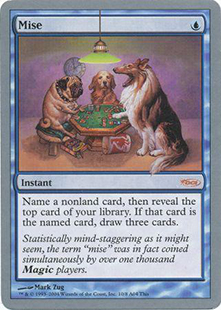 I've noticed in discussions on our forums, on Facebook, on Twitter, and in articles, that many of you in the finance community are not like me. Many financiers are regular attendees of FNM, if not larger tournaments, and tend to apply the competitive mindset to their MTG finance activities. I got my DCI number at the Unhinged prerelease---eight years after I started playing---and have only attended a handful of tournaments since.
I've noticed in discussions on our forums, on Facebook, on Twitter, and in articles, that many of you in the finance community are not like me. Many financiers are regular attendees of FNM, if not larger tournaments, and tend to apply the competitive mindset to their MTG finance activities. I got my DCI number at the Unhinged prerelease---eight years after I started playing---and have only attended a handful of tournaments since.
At heart I'm a casual player who particularly loves multiplayer games, preferably with five or more players. I'm one of those people who allegedly buys a lot of Magic product but is not commonly found at tournaments, as they simply don't appeal to me.
Casual players are great trading partners if you know how to approach them. Today I want to attempt to give you some insight into the casual mindset.
What Is Casual Play?
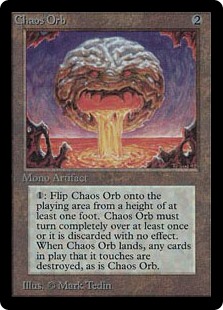 Admittedly casual is different for different people, however what I will be referring to in this article are games played for fun with nothing but bragging rights on the line. Some of the people playing this way will only have a couple hundred cards, while others may have hundreds of thousands. This includes both one-on-one and multiplayer games, though in my experience most casual players take a "more the merrier" approach to Magic, so multiplayer games are more common.
Admittedly casual is different for different people, however what I will be referring to in this article are games played for fun with nothing but bragging rights on the line. Some of the people playing this way will only have a couple hundred cards, while others may have hundreds of thousands. This includes both one-on-one and multiplayer games, though in my experience most casual players take a "more the merrier" approach to Magic, so multiplayer games are more common.
Casual is about the crazy plays, having fun, experimenting, and kicking your friends' asses. You'll often see casual players try to accomplish something other than winning in the most efficient and/or reliable way possible. We like to win in fun and interesting ways, generally without interfering much with other players' fun while at it.
A casual player will choose a deck to play based on how he or she estimates the opponents' strength, with the intention of creating an interesting game. They'll probably even apologize if it seems they failed at this task. No casual player likes to just crush an opponent every game (though admittedly it's fun every once in a while). The experienced casual player will even reach a point where they deliberately pick a weaker deck or strategy to see if they can still manage to win based on superior play alone.
The most important thing to remember is that casual players want all players in the game to have fun (though themselves most of all).
Cards That Excite Casual Players
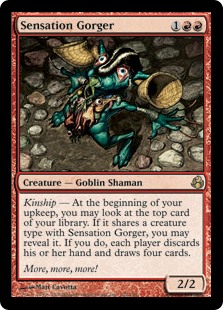 Different players like different things. There certainly isn't one mold that will fit every casual player. However, certain aspects, especially when combined, make a card much more likely to draw a casual player's attention:
Different players like different things. There certainly isn't one mold that will fit every casual player. However, certain aspects, especially when combined, make a card much more likely to draw a casual player's attention:
- WOW! Factor - How much potential does this card have? Can you create a crazy board position with it? Will opponents be impressed when you manage to resolve this? Does it lead to memorable stories?
- Playability - Contrary to popular belief, the casual player does care about things like mana cost---they will, however, be more willing to see steeper costs as a challenge rather than an impossibility. Can a card's drawback be (easily) overcome?
- Scalability - Casual players will often find themselves in multiplayer games. They know Swords to Plowshares is a good card, but they also know that Wrath of God is much better at dealing with threats from multiple players.
- Personal Taste - Some players like to build pillow forts, others want to attack with the most impressive creature they can, and yet others go for the biggest army they can muster---a friend of mine will play anything just as long as it's mono-white. How does this card compare to the taste of this particular player?
Long ago, a different way of looking at cards for casual through a multiplayer lens was proposed by Anthony Alongi. You'll still find his animal-based descriptions used by some writers and they are good to be aware of. Other casual writers of note are The Ferret (who in many ways is like the anti-Anthony Alongi) and Abe Sargent, though there are many more good ones out there.
I would certainly recommend looking through a few of these authors' more general articles to get a taste for what kind of cards and decks a casual player likes and how they use them. They've both written for Star City Games. The Ferret also did some articles on DailyMTG, while Abe has gone to Gathering Magic where he still writes.
Finding Casual Players
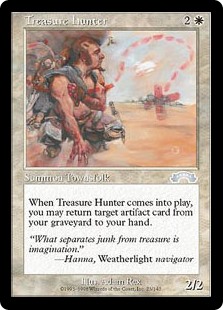 This will likely be your biggest challenge. As mentioned before, we don't tend to show up at tournaments. We do visit the local game store (LGS), but many of us browse around a bit, perhaps buy some stuff, and then leave again. We'll play anywhere, but usually at people's homes. In all honesty, we are difficult to find.
This will likely be your biggest challenge. As mentioned before, we don't tend to show up at tournaments. We do visit the local game store (LGS), but many of us browse around a bit, perhaps buy some stuff, and then leave again. We'll play anywhere, but usually at people's homes. In all honesty, we are difficult to find.
What you're basically going to have to do is follow the trail of cards: which unfamiliar faces do you see at the LGS browsing through the bulk commons, uncommons and rares? Who walks around looking at the games going on? Who takes the casual cards out of the store's binder? Or who buys packs and then leaves with them?
Strike up a conversation with these people. How do they play? Where do they play? Don't judge! If they enthusiastically start telling you about their Monsters from the Deep deck, try to think along rather than suggesting there are better things out there than Krakens and Leviathans. Ask if they are playing Quest for Ula's Temple and suggest that Paradox Haze or Sensei's Divining Top may make it easier to get counters on there, rather than suggesting they go for Merfolk instead. Maybe ask if you can join them some day and make sure to bring a deck that seems to be at a similar level (and bring weaker options too!).
You'll find that once you've made contact with a group they may know about other groups too. Ask where else they play, which formats or deck archetypes they like, whether they've tried other formats and what they thought of them. Ultimately ask where they get their cards and perhaps make some trades with them.
You're building a relationship here, so whatever you do, be fair or even generous. Most of all, have fun and be fun! These people have invited you to their inner circle; you want to be invited again.
Trading with Casual Players
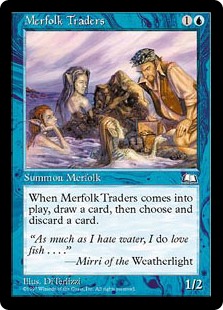 This is where your new friends will shine. Casual players are likely to be interested in a different subset of cards than the typical competitive fare.
This is where your new friends will shine. Casual players are likely to be interested in a different subset of cards than the typical competitive fare.
Differences in valuation lead to arbitrage opportunities. On one side, you can pick up cards casual players love from competitive players; then trade those for tournament staples the casual players aren't as interested in. You'll likely make gains on both sides. It becomes particularly interesting when both groups you move in use different price sources and when you can move bulk from one group for value to the other group.
So how do you make these trades? Casual players tend to think in decks. As such you want cards of a color grouped together in your binder(s). They won't usually care much for formats, but they may care for a grouping that focuses on cards that fit together. Let them pick out stuff that they like---they'll probably find plenty. Then have a look at their cards and find something worth trading up for, as getting many cool cards for one tends to look pretty good from their perspective.
They may have a specific place they go for prices, though in my experience many still go old-school and simply consider their own view on the trade, or assume you will make them a fair proposal (and do!). Don't be surprised if they get their friends' opinion---this is part of the group dynamic. Do pay attention to who they ask, as there's usually a player who's considered more knowledgeable on these things who you'll want to get on your side.
Many casual players love experimenting and will regularly build new decks. Maybe you can even get into the position of the guy to ask for the cards they need (it can be your niche). Sometimes they will be inspired to build a new deck simply by browsing through your binders and coming across cards they haven't seen before.
Expect them to dig new cards out of your binder every time. On the other hand, expect their binders not to change much except around new set releases or possibly when they abandon a deck. If you find that their binders are starting to deplete you may want to look for more casual groups and extend your reach.
Your gain in all of this is primarily an out for cards that you would've previously buylisted or even bulked out. You can easily give them a little extra if that's your alternative.
Final Words
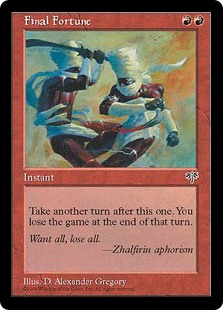 Don't expect miracles from casual players. They will not (frequently) turn your bulk into gold. Most are aware that competitive Magic exists and that card prices have a relation to it. However, they do tend to be easy to trade with and good company.
Don't expect miracles from casual players. They will not (frequently) turn your bulk into gold. Most are aware that competitive Magic exists and that card prices have a relation to it. However, they do tend to be easy to trade with and good company.
As for identifying casual cards, there's no foolproof method, but with experience you develop a feel for it. In my next article I'll take a look at cards from David Schumann's review of Eternal Masters (part one and part two) where he discussed the casual merits of the set. I'll discuss where his views and mine differ. If you have any other cards you want me to look at, please post them in the comments.
Have fun, and thanks for reading!


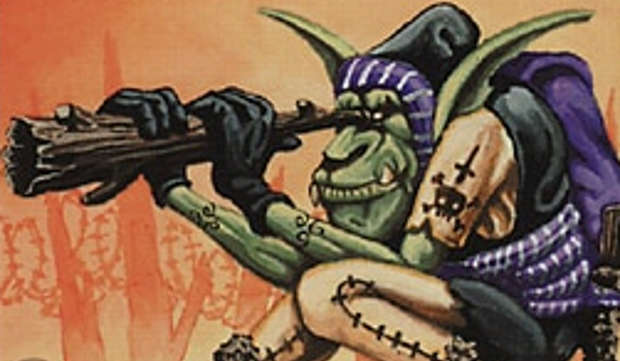



This article is spot on “TRUTH!”. As a small LGS in a small town, I cater to this particular market more than any other. Casual players can be more impulsive in their buys because of the WOW! factor, while competitive players tend to be more reserved and also tend to shop around more, i.e. not as loyal. I look forward to your next article.
Thanks!
Don’t forget to check out my previous article if you haven’t yet.